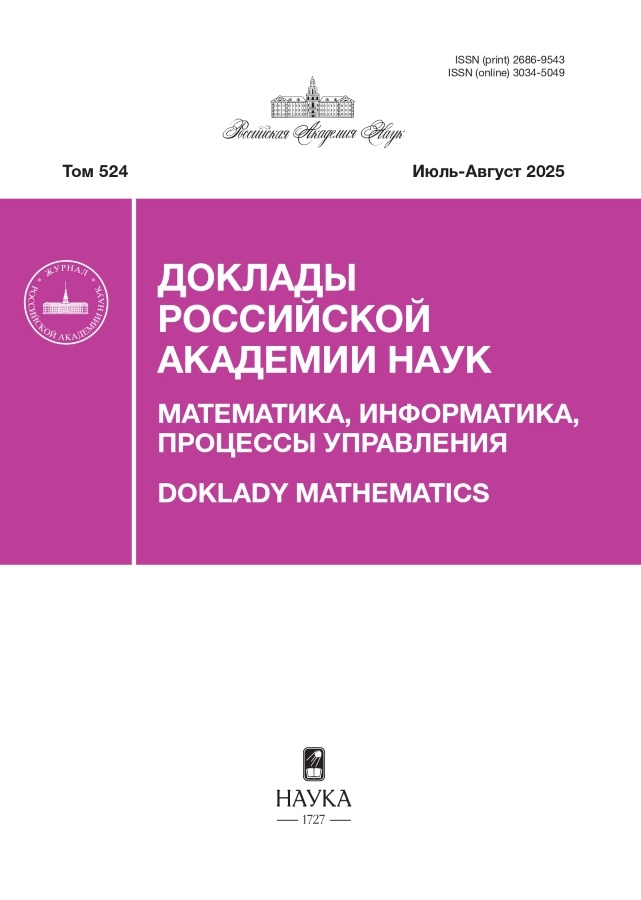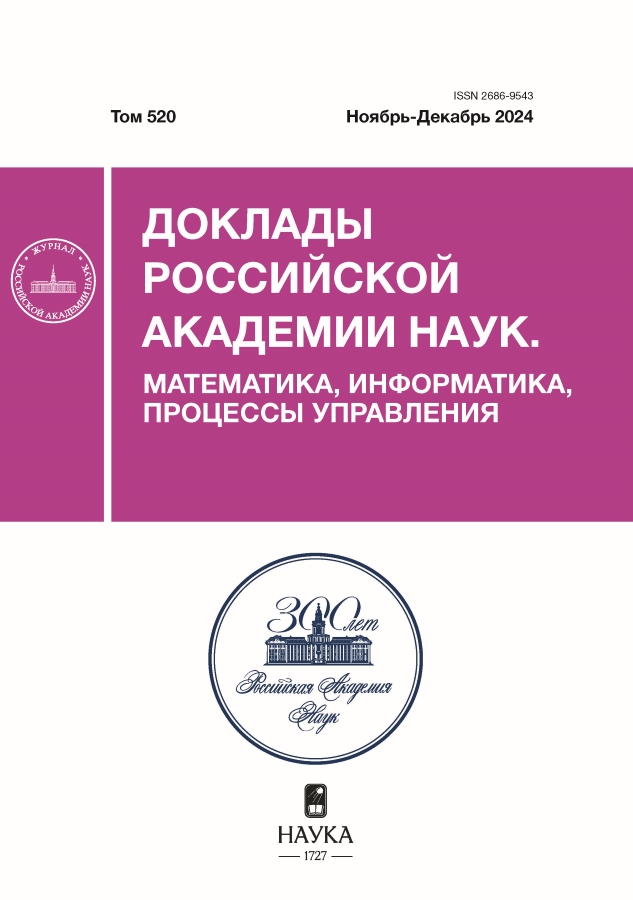ИНДЕКС ЭТИЧНОСТИ РОССИЙСКИХ БАНКОВ НА ОСНОВЕ ИСКУССТВЕННОГО ИНТЕЛЛЕКТА
- Авторы: Сторчевой М.А.1, Паршаков П.А.2,3, Паклина С.Н.2, Бузмаков А.В.2, Кракович В.В.1,2
-
Учреждения:
- Санкт-Петербургская школа экономики и менеджмента, НИУ ВШЭ в Санкт-Петербурге
- Международная лаборатория экономики нематериальных активов, НИУ ВШЭ в Перми
- Московская школа управления СКОЛКОВО
- Выпуск: Том 520 (2024)
- Страницы: 70-81
- Раздел: ИНФОРМАТИКА
- URL: https://rjeid.com/2686-9543/article/view/682693
- DOI: https://doi.org/10.31857/S2686954324060111
- EDN: https://elibrary.ru/KKLCMK
- ID: 682693
Цитировать
Полный текст
Аннотация
Ключевые слова
Об авторах
М. А. Сторчевой
Санкт-Петербургская школа экономики и менеджмента, НИУ ВШЭ в Санкт-ПетербургеСанкт-Петербург, Россия
П. А. Паршаков
Международная лаборатория экономики нематериальных активов, НИУ ВШЭ в Перми; Московская школа управления СКОЛКОВОПермь, Россия; Москва, Россия
С. Н. Паклина
Международная лаборатория экономики нематериальных активов, НИУ ВШЭ в ПермиПермь, Россия
А. В. Бузмаков
Международная лаборатория экономики нематериальных активов, НИУ ВШЭ в ПермиПермь, Россия
В. В. Кракович
Санкт-Петербургская школа экономики и менеджмента, НИУ ВШЭ в Санкт-Петербурге; Международная лаборатория экономики нематериальных активов, НИУ ВШЭ в Перми
Email: mstorchevoy@hse.ru
Санкт-Петербург, Россия; Пермь, Россия
Список литературы
- Гришанкова C. Д. Рейтинги ESG. ESGтрансформация как вектор устойчивого развития: В трех томах. Том 2. Под общ. ред. К. Е. Турбиной и И. Ю. Юргенса. М.: Издательство “Аспект Пресс”, 2022.
- La Torre M., Cardi M., Leo S., & Schettini Gherardini J. ESG Ratings, Scores, and Opinions: The State of the Art in Literature. Contemporary Issues in Sustainable Finance, 2023. С. 61–102.
- Игнатова О. В. ESG-рейтинги российского бизнеса. РИСК: Ресурсы, Информация, Снабжение, Конкуренция. 2022. № 1.
- Петров В. О., Стариков И. В., Фурщик М. А. Особенности отечественных ESG-рейтингов // Журнал Бюджет. 2022. № 4.
- Казаков А., Денисова С., Барсола И., Калугина Е., Молчанова И., Егоров И., Костерина А. et al. ESGify: автоматизированная классификация экологических, социальных и управленческих рисков // Доклады Российской академии наук. 2023. Т. 514. № 2.
- Brown T. J., & Dacin P. A. The company and the product: Corporate associations and consumer product responses. Journal of marketing, 61(1), 1997.
- Folkes V. S., & Kamins M. A. Effects of information about firms’ ethical and unethical actions on consumers’ attitudes. Journal of consumer psychology, 8(3), 1999.
- Sen S., & Bhattacharya C. B. Does doing good always lead to doing better? Consumer reactions to corporate social responsibility. Journal of marketing Research, 38(2), 2001.
- Brunk K.H. Exploring origins of ethical company/brand perceptions—A consumer perspective of corporate ethics. Journal of business research, 63(3), 2010.
- Khan I., & Fatma M. Understanding the Influence of CPE on Brand Image and Brand Commitment: The Mediating Role of Brand Identification. Sustainability, 15(3), 2023.
- Fombrun C. J., Gardberg N. A., & Sever J. M. The Reputation Quotient SM: A multi-stakeholder measure of corporate reputation. Journal of brand management, 7, 2000.
- Yang C. C., Tang X., Wong Y. C., & Wei C. P. Understanding online consumer review opinions with sentiment analysis using machine learning. Pacific Asia Journal of the Association for Information Systems, 2(3), 2010.
- Sokolov A., Mostovoy J., Ding J., & Seco L. ESG Index from Tweets and News Articles. Proceedings of the 2020 Workshop on NLP Business Applications. 2020.
- Briscoe-Tran H. Do employees have useful information about firms’ ESG practices? Fisher College of Business Working Paper, 2023.
- Jain P. K., Pamula R., & Srivastava G. A systematic literature review on machine learning applications for consumer sentiment analysis using online reviews. Computer science review, 41(1), 2021.
- Wankhade M., Rao A. C. S., & Kulkarni C. A survey on sentiment analysis methods, applications, and challenges. Artificial Intelligence Review, 55(7), 2022.
- Rantanen A., Salminen J., Ginter F., & Jansen B. J. Classifying online corporate reputation with machine learning: a study in the banking domain. Internet Research, 30(1), 2020.
- Agrawal S. R., & Mittal D. Optimizing customer engagement content strategy in retail and E-tail: Available on online product review videos. Journal of Retailing and Consumer Services, 67, 2022.
- de Kok S., Punt L., van den Puttelaar R., Ranta K., Schouten K., & Frasincar F. Review-Aggregated Aspect-Based Sentiment Analysis with Ontology Features. Progress in Artificial Intelligence, 7(4), 2018.
- https://doi.org/10.1007/s13748-018-0163-7
- Sanei A., Сheng J., Adams B. The Impacts of Sentiments and Tones in Community-Generated Issue Discussions. IEEE/ACM 13th International Workshop on Cooperative and Human Aspects of Software Engineering, CHASE, 2021. https://doi.org/10.1109/CHASE52884.2021. 00009
- Mirtalaie M. A., Hussain О. K. Sentiment Aggregation of Targeted Features by Capturing Their Dependencies: Making Sense from Customer Reviews. International Journal of Information Management, 53, 2020. https://doi.org/10.1016/j.ijinfomgt.2020.102097. 2020
- Basiri M. E., Kabiri A., Abdar M., Mashwani W. K., Yen N. Y., Hung J. C. The Effect of Aggregation Methods on Sentiment Classification in Persian Reviews. Enterprise Information Systems, 14(9–10), 2020. https://doi.org/10.1080/17517575.2019.1669829
- Graham J., Haidt J., & Nosek B. A. Liberals and conservatives rely on different sets of moral foundations. Journal of personality and social psychology, 96(5), 2009.
- Halamka R., & Teplý P. The effect of ethics on banks’ financial performance. Prague Economic Papers, 26(3), 2017.
- Alotaibi K. O., Mubarak I. A. S., & Alhammadi S. Perceptions of Concerned Parties about Governance and Business Ethics in Kuwaiti Banks, June, 2020.
Дополнительные файлы











